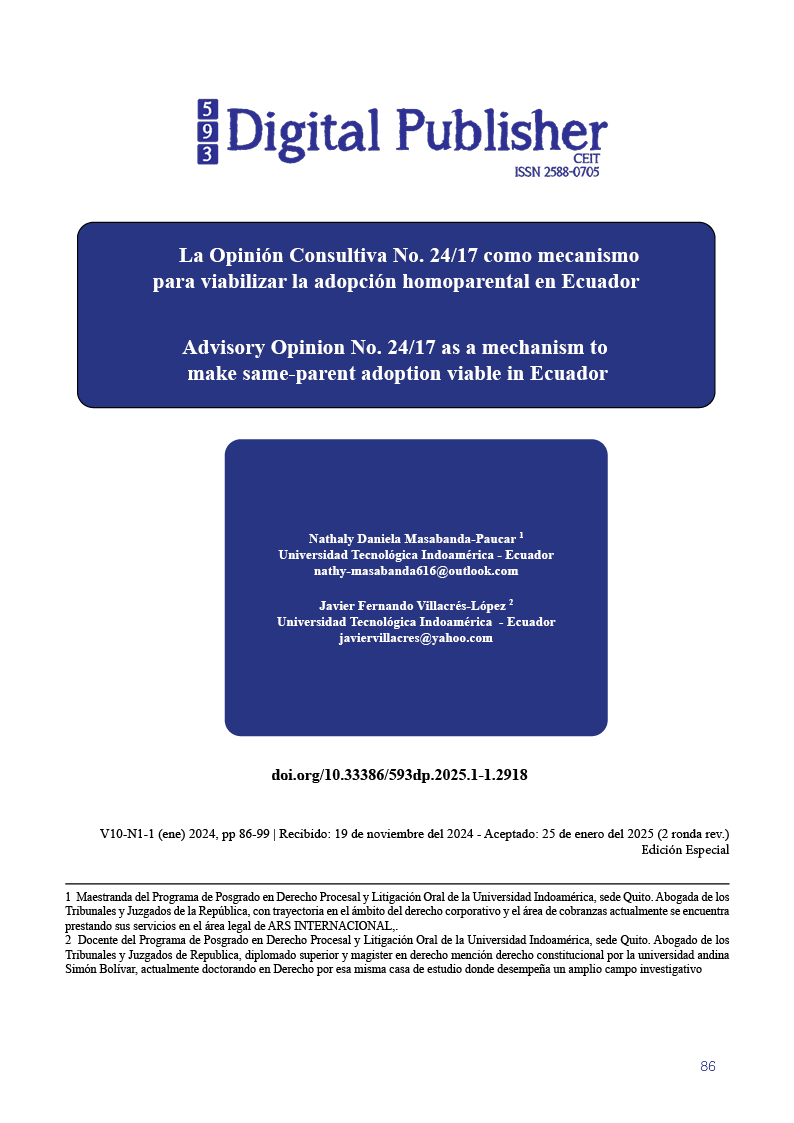Advisory Opinion No. 24/17 as a mechanism to make same-parent adoption viable in Ecuador
Main Article Content
Abstract
This work is developed in response to the question: How can Advisory Opinion No 24/17 of the Inter-American Court of Human Rights serve as a mechanism to make homoparental adoption viable in Ecuador, considering the social, cultural and legal context of the country? To answer this, it is necessary to analyze the homoparental adoption in Ecuador, based on the analysis of the current situation regarding the cultural, legal, traditional and social position that exists in the Ecuadorian society versus the already recognized equal marriage and all that this figure repre-sents. It will be required the respective regulatory and structural contingent on behalf of the State in order to consider the feasibility and the origin of the homoparental adoption in Ecuador as a referral to Advisory Opinion 24/17. The following are addressed in the main points of analysis: 1-Social, cultural and legal context of adoption in Ecuador; 2.- Nature of Advisory Opinion OC-24/17; 3.- Same-sex marriage in Ecuador as a starting point towards equality; 4- Homoparental adoption from the perspective of comparative law; 5.- Challenges of same-sex adoption in Ecua-dor. In such a way, it is concluded the possibility and evident necessity of the application and institution of a homoparental adoption in Ecuador, taking the arguments of the Advisory Opi-nion 24/17 and generating the logical roadmap of attention.
Downloads
Article Details

This work is licensed under a Creative Commons Attribution-NonCommercial-ShareAlike 4.0 International License.
1. Derechos de autor
Las obras que se publican en 593 Digital Publisher CEIT están sujetas a los siguientes términos:
1.1. 593 Digital Publisher CEIT, conserva los derechos patrimoniales (copyright) de las obras publicadas, favorece y permite la reutilización de las mismas bajo la licencia Licencia Creative Commons 4.0 de Reconocimiento-NoComercial-CompartirIgual 4.0, por lo cual se pueden copiar, usar, difundir, transmitir y exponer públicamente, siempre que:
1.1.a. Se cite la autoría y fuente original de su publicación (revista, editorial, URL).
1.1.b. No se usen para fines comerciales u onerosos.
1.1.c. Se mencione la existencia y especificaciones de esta licencia de uso.
References
Arias de Ronchietto, C. E. (2010). Inconstitucionalidad de la Ley Argentina 26.618 de 2010. Su Reforma. El Matrimonio Es un Bien Jurídico Exclusivo del Varon y la Mujer, como Tales. En Consecuencia, es Indisponible por el Estado. -69 Prudentia Iuris, 68, 125. de Colombia, C. C. (2015). Sentencia C-683/15. Recuperado de http://www. corteconstitucional. gov. co/comunicados, (2050).
Barrancos, D. (2023). Libreria—CLACSO - Mujeres y LGBTI+ en Argentina. https://libreria.clacso.org/biblioteca_mujeres_generos_diversidad/publicacion.php?p=3120&b=23
Benavides Ordóñez, J. y Escudero Soliz, J. 2020. Control concreto de constitucionalidad y matrimonio civil igualitario en Ecuador. Revista derecho del Estado. 47 (ago. 2020), 145–175
Cárdenas-Yánez, N. S., Solano-Paucay, V. M., Álvarez-Coronel, L., & Coello-Guerrero, M. E. (2021). La familia en Ecuador: Un enfoque desde lo jurídico. Revista Arbitrada Interdisciplinaria Koinonía, 6(11), 129-146.
Codificación, C. N. (2005). Código Civil. Quito: Fielweb.
Código de la Niñez y la Adolescencia. (2019). Código Orgánico de la Niñez y la Adolescencia. Quito: Corporación de Estudios.
Constitución de la República del Ecuador. (2008). Constitución de la República del Ecuador
Corte Constitucional. Sentencia T-188 de 2024. Sala Primera de Revisión
Corte Interamericana de Derechos Humanos. Opinión Consultiva No. 24/17.
De la Fuente, M. L. (2005). Ley 13/2005, de 1 de julio por la que se modifica el Código Civil en materia de derecho a contraer matrimonio. Foro. Revista de ciencias jurídicas y sociales, (2), 411-438.
Espinosa, D. P. (2022). La adopción de menores en Ecuador, viabilidad, fase judicial y alternativas.
Jácome-Noguera, I. J., & Guerra-Coronel, M. A. (2022). El matrimonio igualitario en Ecuador. Dominio de las Ciencias, 8(1), Article 1. https://doi.org/10.23857/dc.v8i1.2507
Matrimonios homosexuales registrados en Ecuador. (s. f.). Statista. Recuperado 2 de septiembre de 2024, de https://es.statista.com/estadisticas/1240954/numero-de-matrimonios-homosexuales-en-ecuador/
Organización de Estados Americanos. (1969). Convención Americana sobre Derechos Humanos (Pacto de San José) (Gaceta Oficial No. 9460 del 11 de febrero de1978)
Osorio, I. C. F. (2017). LA ADOPCIÓN POR LAS FAMILIAS HOMOPARENTALES EN MÉXICO: ANÁLISIS DEL INTERÉS SUPERIOR DEL NIÑO. https://ri.ujat.mx/handle/20.500.12107/2485
Piedrahita Ordoñez, J. W. (2020). Despenalización de la homosexualidad en el Ecuador en 1997: De la criminalización a la patologización. Una mirada sobre el acceso, uso y disfrute del espacio público de la población LGBTI. https://www.dspace.uce.edu.ec/entities/publication/www.dspace.uce.edu.ec
Pozo, P., & Sebastián, A. (2021). Reconocimiento legal de la adopción homoparental en Ecuador. https://dspace.uniandes.edu.ec/handle/123456789/12470
Salazar, D., Cobo, A. I., Cruz, C., Guevara, M., & Mesías, M. P. (2019). La fuerza vinculante de las Opiniones Consultivas de la Corte Interamericana de Derechos Humanos a la luz del derecho y la justicia constitucional en Ecuador. FORO. Revista de Derecho, 123-143. https://doi.org/10.32719/26312484.2019.32.7
Tarre, P. (2022). ¿Qué es una Opinión Consultiva? https://www.estudiaderechoshumanos.com/post/que-es-una-opinion-consultiva
Tapia, D. A. C. (2009). El bloque de constitucionalidad en el Ecuador. Derechos Humanos más allá de la Constitución. Foro, Revista de Derecho, (12), 5-29.



